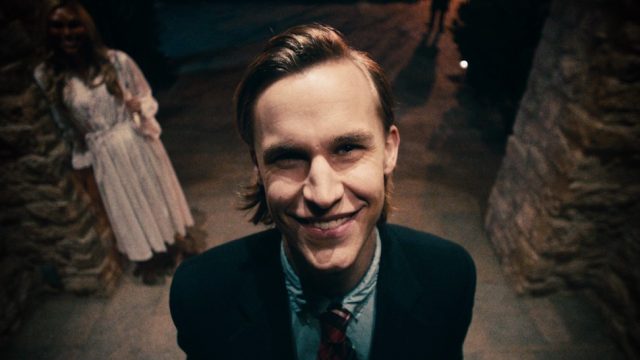The Purge is an oddly fortunate franchise, sort of like the cinematic equivalent of an unintentional war profiteer or innocent Ivermectin suppliers peacefully selling dewormer in the halcyon days of yore. The more the world burns down around us, with the less-protected cheerfully sacrificed for the cause of profit, stability, and in-group cohesion for the rich, the more relevant these movies get.
Of course, social relevance alone can’t make a good film; all it can do is add an unexpected shine. The Purge has good old-fashioned B-movie bones. It’s a solid, effective little thriller with some worldbuilding, conscience, and satire, sort of like an ultra-gory episode of The Twilight Zone.
In this especially fascist variation of 2022–one that obsessively honors the “New Founding Fathers”–the Sandins are supposed to have nothing to worry about on Purge Night. They’re white, upper-upper-middle class, safely ensconced in their gated community. They’ve even had a good year: James Sandin (Ethan Hawke) works for a top security company, and he’s sold systems to most of the neighborhood. They’re decorous, respectful citizens. They support the Purge, and if they had ugly emotions that needed to be vented against their fellow Americans, of course they would participate–or so they assure their young son, who is troubled by this annual outpouring of violence. They just don’t feel the need to join in. As they sit in their comfortable home, they can easily believe this has nothing to do with them–that they’re never going to suffer any atrocities and that, because they’re not out there actively committing them, their hands are clean.
Of course, when push comes to shove, James Sandin knows that all these expensive security systems come with the implicit assumption that no one’s really going to target you. Just having such a system, demonstrating your wealth and power, will make people walk away and choose softer, easier targets.
Most of the time it’s true, but not always. Sooner or later, it’s your turn–and sooner or later, you have to accept not only what you’ve done but what you’ve not done.
That gets highlighted when the one Sandin too young to have internalized the Purge’s cruelty–Charlie (Max Burkholder), who has in fact been made super weird by it, leaning into the gothic and the grotesque to deal with the sanitized, state-sanctioned violence–opens up their fortress-like security to let in a bloodied, hunted stranger (Edwin Hodge). His hunters–killers costumed like smiling preppies, the outfits only semi-ironic–view this as class betrayal. They don’t want to hunt the Sandins, but if the Sandins are insisting on protecting this “pig” who is their rightful prey … if the Sandins are implying that this man is equally human … then clearly the Sandins have forfeited their position and must be punished.
James and Mary Sandin would be fine with turning over the stranger, but they can’t find him. He–at least at first–has no intention of sacrificing himself for them, and Charlie helps keep him safe. The huge house that’s been a symbol of how protected and successful they are now becomes a liability: it’s vast enough that they can’t even consistently find each other, let alone someone who’s actively hiding, and there are so many appealing points of entry. Far too many to guard.
The Purge keeps things moving, with good and sometimes surprising plotting. A siege becomes a home invasion thriller becomes paranoid horror with an edge of potential torture porn becomes tense, tentatively hopeful (extremely tentatively hopeful) social science fiction. From its structure to its style of social commentary, it feels like a throwback to earlier decades of genre filmmaking. For all that it’s contemporary and even depressingly predictive, this timeless, straightforward simplicity–this ability to translate most of its messages into story, image, or performance–is what gives it its staying power.
The Purge is streaming on HBO Max.

